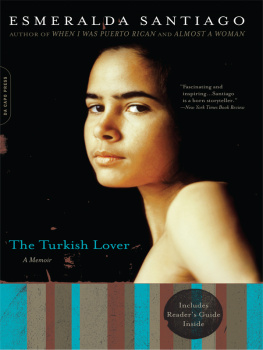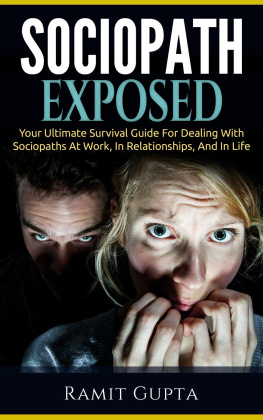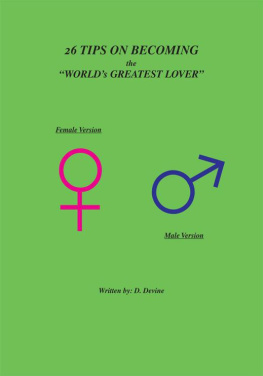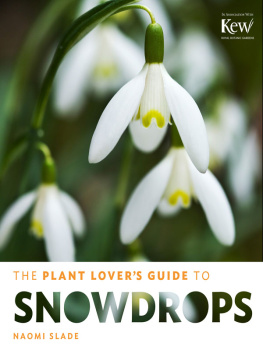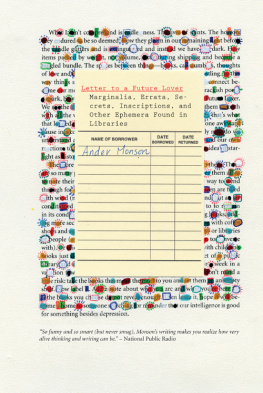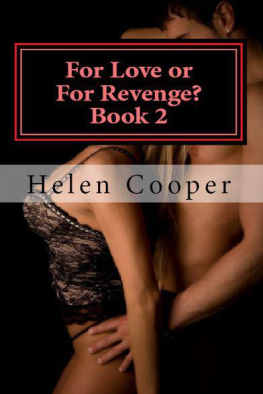When Its Time to Leave Your Lover
A Guide for Gay Men
When Its Time to Leave Your Lover
A Guide for Gay Men
Neil Kaminsky, LCSW
1999 by The Haworth Press, Inc. All rights reserved. No part of this work may be reproduced or utilized in any form or by any means, electronic or mechanical, including photocopying, microfilm, and recording, or by any information storage and retrieval system, without permission in writing from the publisher.
First published by
The Haworth Press, Inc., 10 Alice Street, Binghamton, NY 13904-1580
This edition published 2012 by Routledge
Routledge
Taylor & Francis Group
711 Third Avenue
New York, NY 10017
Routledge
Taylor & Francis Group
2 Park Square, Milton Park
Abingdon, Oxon OX14 4RN
Cover design by Marylouise E. Doyle.
Cover photo 1999 by Mark V. Lynch and Latent Images Photography. This photograph may not be copied, reproduced, or used in any manner whatsoever without prior written permission from: Mark V. Lynch 6402 Evangeline Trail, Austin, TX 78727 USA Phone (512) 250-2106 email mark@latentimages.com. Federal law provides penalties for copyright infringement. 1-800-944-4946 http://latentimages.com.
Library of Congress Cataloging-in-Publication Data
Kaminsky, Neil, 1951-
When its time to leave your lover : a guide for gay men / Neil Kaminsky.
p. cm.
Includes bibliographical references and index.
ISBN 0-7890-0497-6 (alk. paper)
1. Gay male couples. 2. Separation (Psychology) 3. Gay menPsychology. I. Title.
HQ76.K32 1999
306.766DC21
99-14373
CIP
In memory of my ex-partner,
Calvin Martin Lowery, 19591995;
in memory of my aunt, Tillie Young,
19041995 (my other mother);
and to my mom, Gussie Kaminsky,
the very best mother in the whole world.
ABOUT THE AUTHOR
Neil Kaminsky, LCSW, is a licensed clinical social worker in California and holds a social work license in New York State. Practicing in social work for over twenty years, Mr. Kaminsky has worked in diverse areas of the field throughout his career, including school social work, foster care, inpatient psychiatry, adolescent residential treatment, forensic psychiatry, and medical social work. He has also been in private practice in both New York City and San Francisco, working primarily with gay men. He has had significant experience with clients struggling with relationship, self-esteem, and HIV/AIDS issues. Mr. Kaminsky has written several articles that address various topics impacting the gay male community, including HIV/AIDS, spousal relationships, coming out, homophobia, antigay violence, and racism. Mr. Kaminsky currently resides in San Francisco, California, where he is pursuing other writing projects.
CONTENTS
Sex
The Ex, Friends, and Sex: Can Your Friends Now Date Your Ex?
Bad Feelings About Gay Relationships
Writing a book has numerous rewards. One of the greatest pleasures I experienced with this project was the eagerness of so many people to share their time, expertise, and emotional support.
My gratitude is expressed to Robert H. Hopcke, MFCC, who guided me through the fascinating and for me uncharted world of writing and publishing. His vast knowledge and experience has been invaluable. I am grateful to Rik Isensee, LCSW, who graciously invited me to speak about the topic of this book to his class on gay male relationships at City College in San Francisco. His encouragement and the positive energy I felt from his students augmented my excitement about the book. I am grateful to Greg Merrill, MSW, for taking the time to share his insight on gay domestic violence. I learned a great deal from him. Thanks to Thomas J. Caldarola, MFCC, for sharing his knowledge on gay male relationships from his work with gay couples in private practice. My appreciation is expressed to Matthew McKay, PhD, for critiquing the early manuscript, and probably for a million other reasons! His unwavering support and enthusiasm for this project helped motivate me during the difficult times. Thanks to Al Ferrer, MD, for providing psychiatric feedback and other good suggestions. He has never hesitated to offer help when I needed it, and for that I am truly grateful.
A number of gay men were gracious enough to invite me into their lives and recount their uncoupling stories. Some of what they told me appears as quotes in this book. To protect privacy I will not mention their names. I am especially appreciative of this group. As busy as we all are, these men did not hesitate to share their valuable time. They had the courage to disclose very intimate facets of their lives. They revisited sadness and broken dreams and deeply painful memories so that others could benefit from their experiences. That takes a very special spirit, and it deeply impressed me.
Thanks to Bill Palmer, managing editor at The Haworth Press, for giving me the opportunity to make the idea of this book become a reality. My appreciation is expressed to John P. De Cecco, senior editor, for his warm support during the writing of the manuscript. I am very appreciative of Melissa J. Devendorf, administrative assistant, for being consistently pleasant and patient with my innumerable questions about the publishing process. Thanks to Andrew R. Roy, production editor, for his excellent feedback and clear direction. At the time of this writing there are still others at The Haworth Press with whom I have not yet had the pleasure of working. I look forward to my association with them.
I am very blessed with many wonderful friends. In my view it is the quality of ones relationships that governs the quality of ones life. My friends have enriched my life in profoundly meaningful ways.
Thank you, Harry Williams, for being the best buddy (and psychoanalyst) anyone could ever ask for. What would Sunday mornings be without a three-hour long-distance conversation with you? Thank you, Kelvin Fincher, for your emotional support, and for editing some of the manuscript, but especially for hugging me almost to the point of asphyxiation when I told you I had the book contract! I will also never forget our drive along Highway 1. Thank you, Randy Wade, for being in my life. How did we ever spend a year and a half apart? You are very dear to me, Randy, and will forever hold a very special place in my soul. My fervent gratitude to the rest of my wonderful friendsEddie Kunofsky, Rick Roberts, Chucky Hughes, Gordon Gilbert, Tracy Millard, Jerry McLaughlin, Richard Ramaseur, and Milford Chang. You are simply the greatest.
You may have been searching for a lover with an insatiable hunger. Perhaps you had finally had given up trying, only to unexpectedly, and literally perhaps, crash into him. Conceivably you had no plans for love, putting all of your energies elsewhere, only to have Cupid sting you with the certitude that other plans were afoot in the universe. Whatever the situation, the occurrence of your coming together was as unique as it was jubilant. In time, or perhaps at first sight, you fell in love, a feeling universally acknowledged and ubiquitously mystical. Mental health professionals such as myself, for all our so-called expertise on human behavior, are hard pressed to define the chemistry of love. Why is it that we can meet people who have all the right stuff, only to discover that there are no sparks? Therapists, like everyone else, are unable to definitively answer that question. The chemistry of love is one of the mysteries of humanity that remains awe-inspiring in its unwillingness to be empirically scrutinized.


